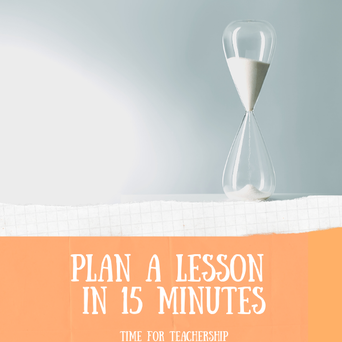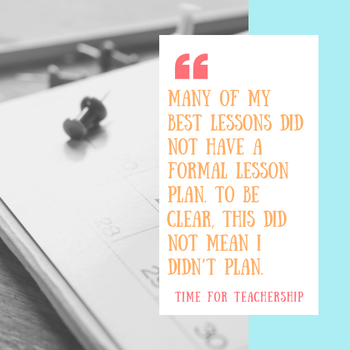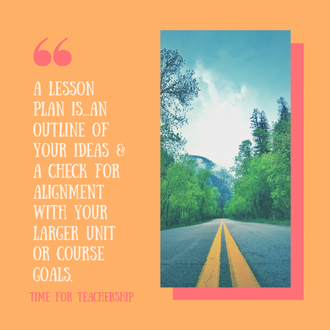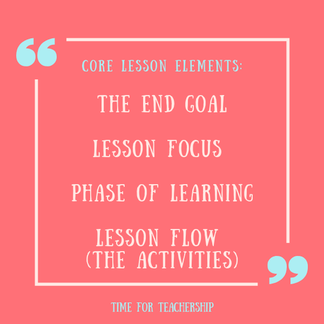|
This may not be a popular thought among instructional coaches or administrators, but I do not like lesson plans. Have I written them when asked? Yes, I have. Did I feel like that was the best way to spend my time? No, I did not. Throughout my teacher training and student teaching, I was asked to turn in lesson plans that were several pages long. While I think this was helpful to organize and express my thoughts as I prepared for the lesson, I think this could have been accomplished in other ways. Maybe I could have video recorded myself planning and narrating why I was making certain instructional choices. I’m not sure what a perfect alternative would be, but what I do know was that telling me how I needed to plan and making me completely script my lessons was not helpful. Many of my best lessons did not have a formal lesson plan. To be clear, this did not mean I didn’t plan. A lot of thought and research went into each lesson plan, but I invested my time being thoughtful about what was going into the lesson and it’s alignment with my broader course goals and summative assessments, not typing out the literal words I would say. To me, an effective lesson plan is one that works for you. It’s an outline of your ideas and a check for alignment with your larger unit or course goals. It is the basis from which your lesson materials emerge. If someone wants to see your class, they can come see it live or request a video of your class in action. If they want to see your planning process, they can sit with you as you plan (or you can send them a video of you planning and narrating your process). Teachers are constantly inundated with all of the things we need to be thinking about in our lessons. There are so many things you could include in your lesson plan that you could spend hours writing one lesson plan. In fact, I bet we all have. I hope that is a distant memory for most teachers, but for some, it may still be the case today. While administrators may require a little convincing that detailed lesson plans are not the best way to spend your time, in most schools, they cannot legally require specific lesson plan formats. When I taught in NYC, the common union refrain was that you could turn in your lesson plan on a napkin, and it would be acceptable (UFT). So, when we think about a less-dense, more streamlined lesson plan, what should be included? That’s truly the teacher’s choice, but here are the core elements of a lesson that I think serve the needs of both teachers and administrators: The End Goal. Know exactly what students need to do for your summative assessment at the end of the unit. What are you working towards? Lesson Focus. Really narrow it down here. What is the ONE thing you want students to walk away knowing or being able to do? I would rather have students do 1 or 2 things really well than get exposure to several skills and lots of content, but not master or retain any of it. Phase of Learning. Speaking of mastery, it’s good to call out whether this lesson is students’ first introduction to a new skill or content, giving students more practice with a previously introduced skill, or putting the final touches on a skill or assessing for mastery. This helps keep your expectations for student performance in line with the amount of time students have had to work on a skill. (We tend to provide too little time for students to really master a skill, and cite a need to “cover content” as our rationale.) It is also a good check to ensure that for each skill or piece of content, you have at least one lesson per phase in the unit (or at least the course). Don’t have time? Focus on fewer skills and content. Depth over breadth! Lesson Flow [The Activities]. These are your core protocols for the lesson. I honestly would pick one main activity for student work time. Then, you can add in a hook and assessment activity to bookend the main activity. Within this section of the plan, you may want to note 1-2 key questions students are answering during each protocol, how much time you think each activity will take, and what resources you may need. (If you type your lesson plans, you can link the resources in the plan itself within this section.) If you like to lecture, some things to consider may be limiting your talk time so that students can have independent work time to grapple with the content or skills. You also want to save yourself time on your slide decks. I have found that trying to limit my number of slides helps me narrow my focus to one core concept, so I suggest trying to use just 10 slides per mini lesson with a maximum teacher talk time of 15 minutes. It’s not a hard and fast rule, but pick numbers that work for you and stretch yourself to streamline your mini lessons. To help you, I’ve made a Streamlined Lesson Planning Template for you to take and start planning your lessons, focusing on one thing at a time! (Note: this can also be a helpful planning template if you use prescribed curriculum, as it helps you to internalize the priorities of the lesson, enabling you to make quality instructional decisions about where to adapt or spend more or less time as needed.) The big takeaway here is: Depth over breadth. When planning, remember less is more. Keep it simple, and let your students truly master what you’re teaching.
0 Comments
Leave a Reply. |
Details
For transcripts of episodes (and the option to search for terms in transcripts), click here!
Time for Teachership is now a proud member of the...AuthorLindsay Lyons (she/her) is an educational justice coach who works with teachers and school leaders to inspire educational innovation for racial and gender justice, design curricula grounded in student voice, and build capacity for shared leadership. Lindsay taught in NYC public schools, holds a PhD in Leadership and Change, and is the founder of the educational blog and podcast, Time for Teachership. Archives
May 2024
Categories |





 RSS Feed
RSS Feed